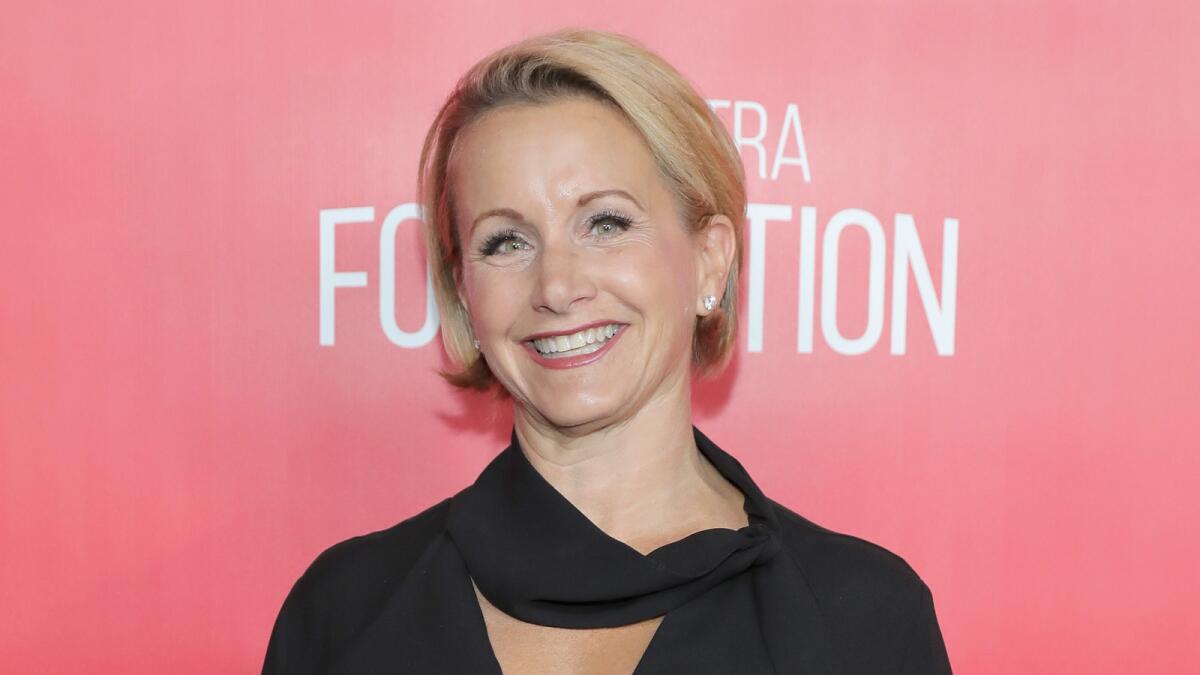Q&A: SAG-AFTRA President Gabrielle Carteris on age bias and Hollywood’s diversity problem

- Share via
It has been nearly six months since Gabrielle Carteris, the former “Beverly Hills, 90210” actress and longtime labor activist, was elected as president of Hollywood’s largest union — and she’s already making her mark.
Carteris, the former executive vice president of SAG-AFTRA, was elected as the union’s president in April to fill out the rest of Ken Howard’s second term after his death.
As the head of SAG-AFTRA, which was formed in 2012 after the historic merger of two formerly warring labor groups, Carteris wields considerable clout in the entertainment industry. And she hasn’t been frightened to use it.
Carteris made headlines recently in her fight for the passage of California law AB 1687, which is known as “the IMDb law.” The legislation, approved by Gov. Jerry Brown last month, requires certain entertainment sites, including IMDb, to remove an actor’s age or birthday upon request, or to not post it in the first place.
The Times recently spoke with Carteris about her advocacy for the measure, her thoughts on Hollywood’s diversity problem and what’s on the minds of actors and other performers.
This so-called IMDb law has generated a lot of attention and controversy. Some groups say it’s unconstitutional. Why was this such an important fight for you?
As a union, we’ve been fighting this for over eight years. But speaking for myself, I’m a woman of a certain age. For me, really, the fight started when I was younger. I was on a show called “Beverly Hills, 90210” [which premiered in 1990]. I was 29 auditioning for the character of Andrea, who was 16. At that time, I didn’t tell them my age upfront. And it allowed me to go in and audition, which was so important — to have the opportunity to walk in the room.
Having that opportunity changed my life. I was able to go and really create the role for them and fulfill the fantasy or the illusion of who the character was and to make it about that instead of having them looking at me and saying, “Oh, I don’t know. She’s too old.” It was a couple of years later — after the show had started becoming recognizable — that my age actually did become public. And they told me at that time, “Boy, are you lucky we didn’t know your age when we first hired you.”
Age discrimination is against the law in every other field of work. But the difference for actors is, it’s not just the resume that you send in. It’s the idea that casting directors have access to these sites to look you up, and the first thing they see is someone’s age. We really narrowly designed this bill to make sure we weren’t infringing on 1st Amendment issues and yet we were allowing people to have their voice if they didn’t want to reveal their age.
Have you gotten any indication from IMDb about whether they’ll challenge the bill?
I have not heard anything yet from IMDb, and I’m not sure the union has either.
What are some of the goals you have set out to achieve as president of SAG-AFTRA?
I am always looking at our contracts. Our contracts are the things that support our members and allow them to have strong and healthy careers and lives to support their families. So I’m looking at those contracts and looking at how I can be the most effective in serving the members that way.
And one of my real interests is to work on inclusivity — looking at diversity and gender equity. That for me, being a woman, is really important. With our leadership, our top three officers are women, which is not something you see in unions around the country or in our industry. I think it’s a testament to our members and to our work that we are about inclusion.
This conversation about diversity has been going on for years. What we have now is the ability to actually connect. I’m having some high-level meetings with people where we talk about, how do we activate from conversation into action. Clearly, we do that through legislation and we look to do that in our contracts. It starts early in the pipeline. I think there’s a true interest in making a shift.
What are you hearing from members about what their concerns are?
The priority clearly for members right now is going to be to have strong contracts in TV and theatrical — we’re coming up on that within the next year (the current contract runs through June 2017). People are focused on making sure we keep our contracts strong and we continue evolving with the changing landscape of our industry.
That expanding digital space has provided a lot more opportunities for actors. But it’s also created some new challenges for some.
There are some disturbing trends taking place. We’re seeing shorter episode orders [on the TV side]. We’re working with contracts that were created 30, 40 years ago. It’s an old paradigm and a new, evolving industry. So that’s part of the conversation we’re working through now.
We’re now getting prepared for [a process known as] W and Ws, which are wages and working conditions. It’s where we bring members from around the country to talk about the issues and concerns of the contracts. And so we’ve been having these conversations starting from the last negotiations. I can’t negotiate the contracts in my conversation with you, but what I can say is we’re collecting all the information with our members to prepare.
We’ve seen a big push to organize performers in the Spanish-language space. Is this a priority for you?
The disparity of wage earning for Spanish-speaking performers versus English-speaking is stunning. We believe in pay equity for all. That’s our fight. We’ve been doing a lot of organizing in the Spanish-language space. La Raza and La Mega are two stations that were non-union before that have come to us to us. They said, “We’ve been abused long enough. And we need your help, SAG-AFTRA.” We’re working to create their first contract.
The most-read Entertainment stories this hour »
Twitter: @villarrealy
More to Read
From the Oscars to the Emmys.
Get the Envelope newsletter for exclusive awards season coverage, behind-the-scenes stories from the Envelope podcast and columnist Glenn Whipp’s must-read analysis.
You may occasionally receive promotional content from the Los Angeles Times.








